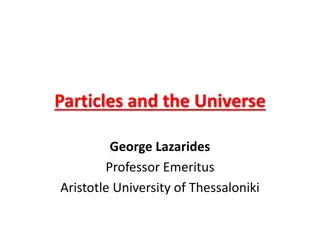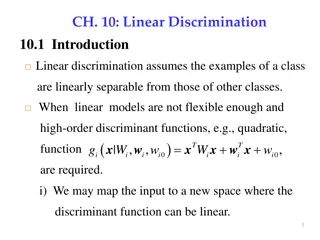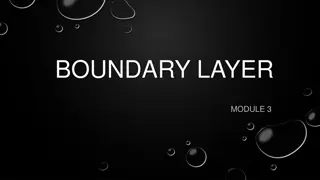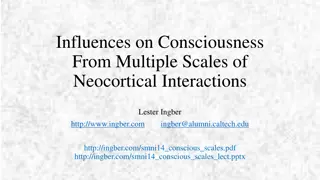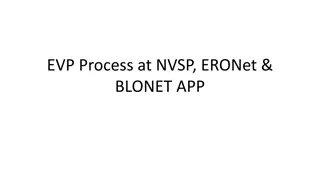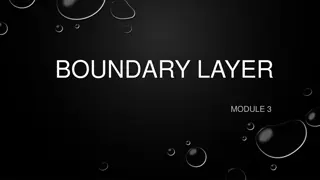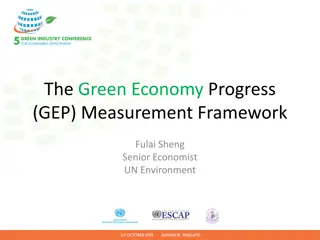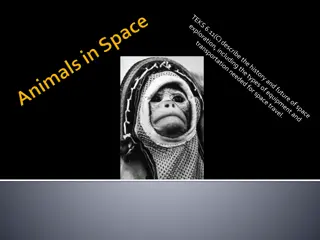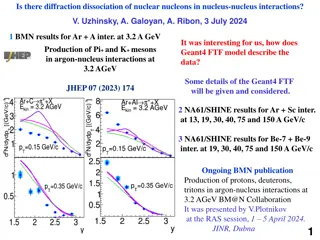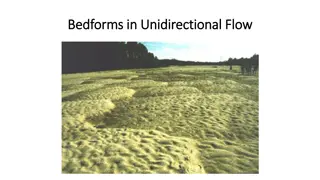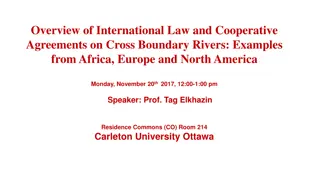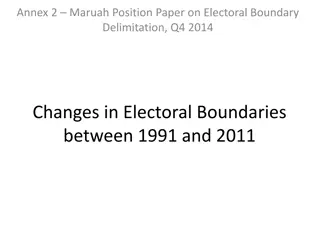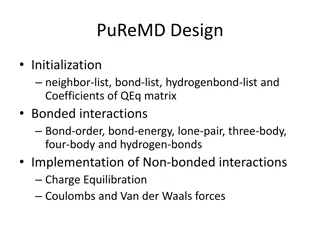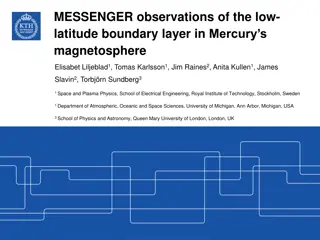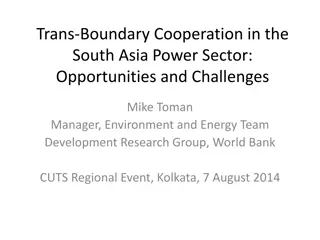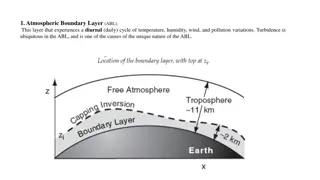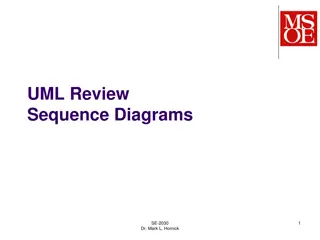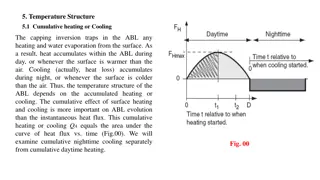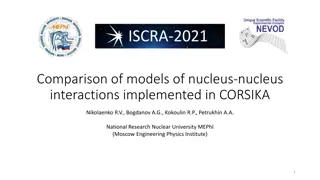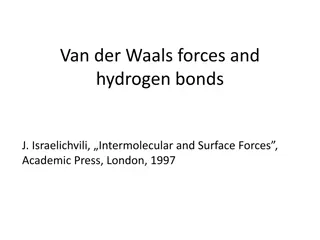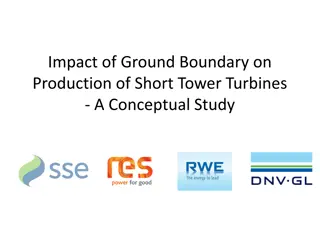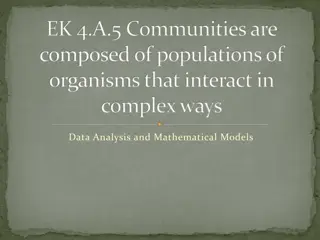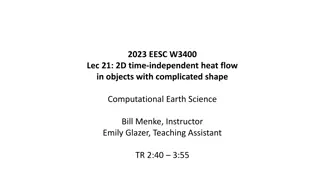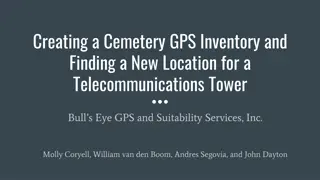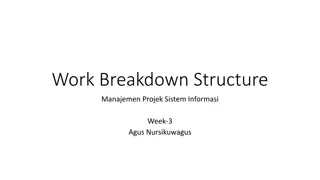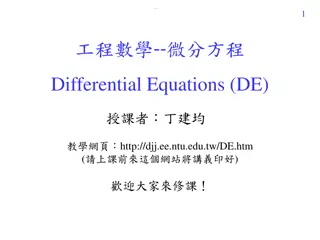Understanding Virus-Cell Interactions: Mechanisms and Consequences
Viruses interact with host cells in various ways, encoding genes that manipulate cell functions for their benefit. These interactions can range from benign to lethal outcomes. Factors influencing these interactions include viral factors, cellular responses, and the presence of virulence factors. Dif
0 views • 37 slides
Understanding Reflection and Transmission of Plane Waves in Electromagnetic Fields
The notes discuss the reflection and transmission of plane waves, wave vectors, fundamental polarizations (TMz and TEz), and boundary conditions at material interfaces. It covers the behavior of different types of plane waves, their interactions, and the conditions that govern their propagation thro
7 views • 57 slides
Exploring Particles and Fundamental Interactions in the Universe
Delve into the intricate world of particles and fundamental interactions in the Universe as explained by Professor Emeritus George Lazarides from Aristotle University of Thessaloniki. Discover the structure of matter, classification of particles based on interactions, constituents of hadrons, conser
1 views • 36 slides
Understanding Hyperfine Interactions in Atomic Physics
Hyperfine interactions play a crucial role in atomic physics, leading to small energy shifts and splitting of degenerate levels in atoms and molecules. These interactions involve the electromagnetic multipole interactions between the nucleus and electron clouds, resulting in the splitting of energy
13 views • 154 slides
5 Medical Cannabis Interactions Every Physician Must Understand
As medical cannabis becomes increasingly integrated into healthcare practices, itu2019s imperative for physicians to be well-versed in potential interactions with other medications. While cannabis offers promising therapeutic benefits, its interactions with certain drugs can pose risks to patients.
1 views • 2 slides
Understanding Linear Discrimination for Classification
Linear discrimination is a method for classifying data where examples from one class are separable from others. It involves using linear models or high-order functions like quadratic to map inputs to class separable spaces. This approach can be further categorized as class-based or boundary-based, e
3 views • 37 slides
Understanding Boundary Layers in Fluid Dynamics
A boundary layer forms when a fluid flows over a solid surface, with viscous forces present close to the surface. It can be laminar or turbulent, determined by the Reynolds number. Flow separation occurs in adverse pressure gradients, affecting lift and causing drag. Efforts to delay separation incl
1 views • 19 slides
Software Quality Assurance: Understanding Unit Testing and Boundary Value Testing
Unit testing is a crucial method in software development to ensure each part of the program behaves as intended. It helps detect problems early and provides a written contract for code quality. Additionally, Boundary Value Testing is a black box technique that focuses on input domain testing, with a
1 views • 49 slides
Exploring Influences on Consciousness Through Neocortical Interactions
Delve into the intriguing realm of consciousness with Lester Ingber's research on the influences stemming from multiple scales of neocortical interactions. The investigations cover various aspects such as mind over matter, recursive interactions, neuronal scales in the neocortex, and statistical mec
1 views • 41 slides
Comprehensive Guide to Online Voter Registration Process at NVSP, ERONet & BLONET App
Navigate through the step-by-step process of online voter registration at NVSP, ERONet & BLONET App. Learn how to verify self-details, check family grouping, handle shifted/dead electors, assist unenrolled citizens, and engage with prospective electors. Explore boundary mapping techniques for creati
0 views • 32 slides
Understanding Boundary Layer and Drag Forces in Fluid Dynamics
Boundary layer module explains the presence of viscous forces near a surface due to fluid flow, leading to laminar or turbulent boundary layers. Flow separation occurs when a boundary layer detaches from a surface, impacting lift and drag forces. Adverse pressure gradients and flow separation phenom
0 views • 19 slides
The Green Economy Progress Measurement Framework Overview
The Green Economy Progress (GEP) Measurement Framework, spearheaded by Fulai Sheng, a Senior Economist at UN Environment, emphasizes an Inclusive Green Economy (IGE) as a tool for sustainable development. It addresses poverty, inequitable prosperity sharing, and planetary boundary concerns by integr
0 views • 6 slides
Exploring Space: Pioneers, Missions, and the Role of Animals
Humans have a rich history of space exploration, with notable milestones including Yuri Gagarin's orbit in 1961, the Apollo 8 moon mission, and Sally Ride becoming the first American woman in space. Before human space travel, animals played a crucial role in understanding the effects of space on liv
4 views • 21 slides
Visualizing Relationships with Data: Earthquakes, Volcanoes, and Plate Tectonics
Explore the locations of earthquakes and volcanoes to understand plate boundary zones, compare plate motion in different regions, and determine plate boundary zones using various data sources. Follow step-by-step instructions to study maps, analyze earthquake and volcano distributions, and engage in
0 views • 37 slides
Understanding Diffraction Processes and Meson Production in Nuclear Interactions
Exploration of diffraction dissociation of nuclear nucleons in nucleus-nucleus interactions using Geant4 FTF model and NA61/SHINE results for various nucleus combinations. Insights into meson production in argon-nucleus interactions at different energies and the impact of models like DCM/AGT, UrQMD,
0 views • 17 slides
Exploring Animated Sprites in Computer Games Lecture #10
Delve into the exciting world of animated sprites with Lecture #10, covering boundary-checking procedures, animating sprites with multiple images, adding animation delays, and making sprites respond to multiple states. Learn about rotating, resizing, moving in different directions, calculating motio
1 views • 74 slides
Bedforms in Unidirectional Flow: Characteristics and Formation
Bedforms in unidirectional flow exhibit various characteristics such as sediment layer thicknesses, boundary layer dynamics, presence of ripples and dunes, and the interplay between flow velocity and sediment deposition. These bedforms, including ripples and dunes, form due to interactions between t
3 views • 13 slides
International Cooperation on Cross-Boundary Rivers: Perspectives from Around the Globe
Delve into the intricacies of international law and cooperative agreements concerning cross-boundary rivers, explored through examples from Africa, Europe, and North America. The discussion covers various legal frameworks, such as the Helsinki Rules, Berlin Rules, Vienna Convention, and more, highli
0 views • 15 slides
Changes in Singapore Electoral Boundary Delimitation from 1997 to 2011
Significant shifts in Singapore's electoral boundaries from 1997 to 2011 highlighted various changes such as GRC expansions, SMC formations, and boundary adjustments affecting multiple constituencies. Key alterations include mergers, splits, and transfers of constituencies to create new electoral la
0 views • 5 slides
PuReMD Design - Initialization, Interactions, and Experimental Results
PuReMD Design involves the initialization of neighbor lists, bond lists, hydrogen bond lists, and coefficients of QEq matrix for bonded interactions. It also implements non-bonded interactions such as charge equilibration, Coulomb's forces, and Van der Waals forces. The process includes the generati
0 views • 23 slides
Insights into the Low-Latitude Boundary Layer in Mercury's Magnetosphere
Study focuses on the low-latitude boundary layer (LLBL) in Mercury's magnetosphere, analyzing magnetosphere and magnetosheath plasma characteristics such as reconnection rates, IMF/magnetic shear, and plasma beta. Results show anti-correlation between LLBL and non-LLBL regions, with different reconn
0 views • 11 slides
Trans-Boundary Cooperation in South Asia Power Sector
This presentation, given at a regional event in Kolkata, discusses the opportunities and challenges of trans-boundary cooperation in the South Asia power sector. It explores the benefits of regional power integration, the analytical approach taken, baseline scenarios, potential impacts of regional c
0 views • 17 slides
Understanding Epistasis: Genetic Interactions and Their Implications
Epistasis is a phenomenon where the phenotypic expression of one gene is influenced by interactions with another gene. This concept, first introduced in 1909, plays a crucial role in genetics, affecting various traits and evolutionary processes. The difference between dominance and epistasis lies in
0 views • 41 slides
Understanding Atmospheric Boundary Layer and Static Stability
The Atmospheric Boundary Layer (ABL) undergoes daily variations in temperature, humidity, wind, and pollution with turbulence being a key factor. Static stability in the environment determines the behavior of air parcels, leading to categorizations of stable, unstable, and neutral conditions based o
0 views • 13 slides
Proposed Boundary Change in Fremont Unified School District
Fremont Unified School District proposes a boundary change affecting Weibel, Leitch, and Warm Springs areas to address overcrowding. The change includes enrollment trends, growth projections, installation of temporary classrooms, and construction of permanent classrooms. The plan aims for board appr
0 views • 13 slides
Understanding UML Sequence Diagrams
UML Sequence Diagrams illustrate high-level interactions between class instances in software programs. They represent method calls and interactions among objects during program execution. The diagrams show interactions for specific circumstances like startup or button clicks. Each class/object is re
0 views • 8 slides
Understanding Temperature Structure and Cumulative Heating/Cooling in Atmospheric Boundary Layer
The temperature structure in the atmospheric boundary layer (ABL) is influenced by cumulative heating or cooling effects from the surface. During the day, heat accumulates within the ABL, while cooling occurs at night. The cumulative heating or cooling is more crucial for ABL evolution than instanta
0 views • 12 slides
Understanding the Planetary Boundary Layer in Atmospheric Science
The Planetary Boundary Layer (PBL) plays a crucial role in atmospheric dynamics, divided into surface, mixed, stable, and residual layers. During the day, the mixed layer experiences convective motions due to surface heating, while the stable layer dominates during the night. Understanding these lay
0 views • 18 slides
Comparison of Models of Nucleus-Nucleus Interactions in CORSIKA
Introduction to the study on models of hadronic interactions at high energies implemented in CORSIKA, a simulation tool used to analyze cosmic ray interactions with Earth's atmosphere. The study compares four widely used models, detailing their features and variants in simulation parameters. Results
0 views • 10 slides
Population Interactions in Nature: Competitive and Cooperative Interactions
Every population, whether animal or plant, engages in competitive and cooperative interactions to fulfill their needs for food, shelter, and resources. Intraspecific competition is common among individuals of the same species, leading to a struggle for survival. Interspecific interactions also play
0 views • 17 slides
Weak Interactions and Hydrogen Bonding in Molecular Forces
Exploring van der Waals forces, hydrogen bonding, and weak interactions in intermolecular forces and surface interactions. Understanding interactions between backbone peptide groups and orientation dependence of hydrogen bonding through dispersion forces and repulsive potentials.
0 views • 22 slides
Understanding Intermolecular Forces in Chemistry
Interactions between static charge distributions in chemistry are governed by Coulomb's Law, playing a crucial role in understanding intermolecular forces. From ion-ion interactions to charge-dipole and charge-quadrupole interactions, the strength of forces varies based on factors like distance and
0 views • 21 slides
Understanding Use Cases and Actors in System Design
Explore the concept of use cases in system design, including user goals versus interactions, system boundaries, actors, and how they all come together in use case diagrams. Learn how use cases capture user-visible functions, achieve discrete goals, and represent the interactions between actors and t
0 views • 20 slides
Exploring the Impact of Cross-Boundary Primary Education Programs
Through a survey encompassing students from various European countries, it was found that participation in cross-boundary primary education initiatives led to increased motivation in learning school subjects like Physics and Physical Education. The projects also helped in enhancing English language
0 views • 15 slides
Ground Boundary Impact on Short Tower Turbines: A Conceptual Study
This conceptual study explores the impact of ground boundary on the production of short tower turbines. It investigates whether two turbines with the same rotor diameter but different hub heights can generate the same energy output. The study examines how the ground boundary influences the airflow p
0 views • 8 slides
Understanding Population Interactions in Communities
Communities are made up of populations of organisms that interact in various ways, shaping the structure of the community. Population interactions include predator-prey relationships, symbiotic interactions like mutualism and commensalism, parasitism, and competitive exclusion. These interactions in
0 views • 25 slides
Computational Earth Science: Solving Heat Flow in Objects with Complex Shapes Using Finite Difference Method
Explore projects involving the Finite Difference Method for solving static heat conduction problems, also known as the Poisson Equation. Topics include testing boundary conditions, symmetry of solutions, point sources, dipoles, and more. Gain insights into changing boundary conditions and understand
0 views • 20 slides
Cemetery GPS Inventory & Telecommunications Tower Location Project
Digitizing the Tower Addition section of the historic San Marcos City Cemetery and identifying an optimal location for a new telecommunications tower. The project involves creating a digital inventory of grave sites and integrating the data into a cemetery management software system. Utilizing vario
0 views • 19 slides
Project Management for Canoe Trip to Boundary Waters
This project involves planning and organizing a canoe trip to Boundary Waters, including tasks such as arranging travel, getting equipment, planning meals, preparing a budget, and managing emergencies. The work breakdown structure and task durations with dependencies are outlined to ensure a smooth
0 views • 8 slides
Understanding Differential Equations and Boundary Value Problems
Explore the world of Differential Equations (DE) with a focus on Boundary Value Problems, guided by Dennis G. Zill and Michael R. Cullen. Dive into the realm of First Order and Higher Order DE, Partial DE, Laplace Transform, Fourier Series, and more. Unravel the complexities of DE through various se
0 views • 33 slides


